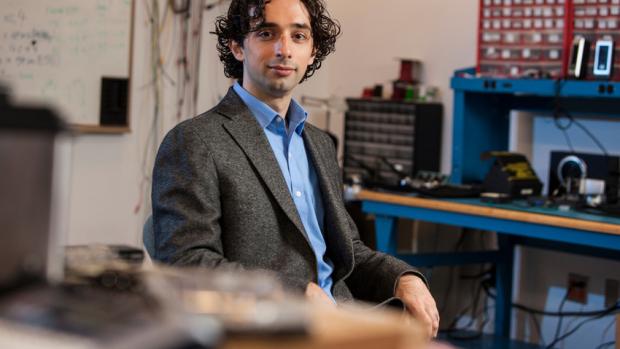MIT Technology Review Names NYU's Jonathan Viventi to Innovators Under 35 List
Developer of Minimally Invasive Brain Sensors Honored

BROOKLYN, New York—A young researcher who is leading the development of revolutionary brain sensors will be named today to the MIT Technology Review annual Innovators Under 35, a list of exceptionally talented technologists whose work holds great potential to transform the world.
Jonathan Viventi, 32, an assistant professor of computer engineering at the New York University Polytechnic School of Engineering, is recognized as a pioneer in the field of biotechnology and medicine for his design of an implantable brain interface that allows researchers to view brain activity at an unprecedented level of spatial resolution. Comprised of an implantable electrode array featuring ultrathin, flexible silicon transistors—the first use of these in a brain device—Viventi’s interface makes it possible to sample activity in large areas of the brain with minimal wiring.
Prior to this innovation, it was impossible to study neurologic events that involve large portions of the brain, like epileptic seizures, in great detail. The process would have required that subjects be wired with as many as 1,000 leads—a feat that is logistically and physically unmanageable with a living subject— leaving researchers to choose between studying high-resolution images of a small part of the brain or low-resolution images of a large part.
Viventi’s brain interface shattered those restrictions. Thin as a sheet of cellophane and equally moldable, his devices allow active circuitry to sit directly on the brain’s surface with no damage to fragile tissue.
His initial experiments focused on epilepsy, and he and his collaborators have been able to observe and document seizure activity in greater detail than ever before. Viventi envisions this early work as a stepping stone in the design of a fully implantable, wireless device that can detect and arrest epileptic seizures—a defibrillator for the brain.
“Over the years, we’ve had success in choosing young innovators whose work has been profoundly influential on the direction of human affairs,” said MIT Technology Review Editor in Chief and Publisher Jason Pontin. “Previous winners include Larry Page and Sergey Brin, the cofounders of Google; Mark Zuckerberg, the cofounder of Facebook; Jonathan Ive, the chief designer of Apple; and David Karp, the creator of Tumblr. We’re proud of our selections and the variety of achievements they celebrate, and we’re proud to add Jonathan Viventi to this prestigious list.”
Katepalli R. Sreenivasan, president and dean of engineering at NYU, congratulated Viventi: “This award spotlights many of the attributes we prize in our faculty and students—scholarship, collaboration, innovation, and the vision and drive to do work that solves real problems and changes lives for the better,” he said. “We are thrilled to see Professor Viventi in the esteemed company of the Innovators Under 35.”
Viventi’s brain interface technology has implications well beyond epilepsy. His group is collaborating with researchers at the NYU Center for Neural Science to develop high-performance motor prosthetics for paralyzed patients, enabling faster and more natural control of robotic arms and computer systems.
They are also adapting the technology to improve the early detection of breast cancer using high-resolution electrical impedance tomography and have forged a partnership with the NYU School of Medicine to design more effective cochlear implants. Viventi is also a faculty member of NYU WIRELESS, an interdisciplinary center that combines research into wireless, medicine, and computers.
Viventi completed his bachelor’s and master’s degrees, both in electrical engineering, at Princeton University. He earned his doctorate in bioengineering from the University of Pennsylvania.
This year’s honorees will be featured online at technologyreview.com starting today, and in the September/October print magazine, which hits newsstands worldwide on September 2. They will appear in person at the upcoming EmTech MIT conference from September 23–25, 2014, in Cambridge, Massachusetts (www.EmTechMIT.com).

